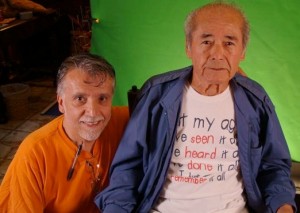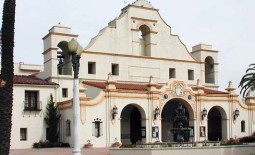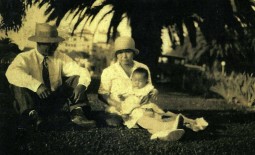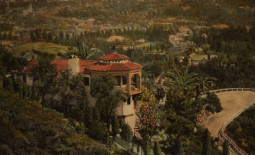Whitewashed Adobe Interviews WWII Veteran Fred Ramirez
The Whitewashed Adobe: The Rise of Los Angeles media team had the privilege to conduct on an-camera interview with Fred Ramírez, a Mexican-American World War II combat veteran. Fred grew up at Simons Brick Company Yard No. 3 in the Los Angeles suburb of Montebello, California, living there from his birth in 1924 until he enlisted into the United States Army in 1943. At the time Fred came into the world, Simons was then the world’s largest brick manufacturing operation in the world, and literally millions upon millions of bricks were produced there and shipped throughout California and the U.S. by truck and train. Fred’s parents had migrated north from central Mexico during the violent years of the Mexican Revolution, and Fred’s father found work at Simons. All but two of Fred’s eldest siblings were born in Simons and raised there.
Though Fred is in his late 80’s, none of his keen memory has diminished, and his vigor and energy is remarkable. Fred consented this week to be interviewed to talk about the vivid memories he had of growing up inside the sprawling Simons factory, which was a facility of almost three hundred acres in size, including the workers’ housing, the brick manufacturing areas and open fields. Fred recalls that though the company housing provided for the workers consisted of poorly built shacks with no running water or heating, each of the scores of family homes had a long backyard lot in which families grew vegetables, planted fruit trees, and even kept farm animals. Many of the men and women brought farming and ranching skills with them from their rural lives in Mexico, and bartering or selling of homemade cheeses, fresh milk, meats, and produce was routine among all the families. Fred fondly remembers how each house had a pretty flower and herb garden in front. People were poor, but they took pride in their self-contained community, and it was a vibrant and generally happy place that was in many ways an ideal and safe environment for children.
All that self-sufficiency served them well in the difficult years of the Great Depression, which hit California and Los Angeles hard, as it did the whole country. Building construction fell dramatically, and Simons brick orders plummeted. On top of that, Los Angeles experienced a very strong earthquake in 1933 and buildings made of bricks were especially devastated. Building construction codes changed drastically after that, which only further diminished brick orders. Work for the Mexican families living in Simons was reduced, and many families had to spend part of the year away from Simons to supplement income with fruit and vegetable picking in California’s vast agricultural regions. Life was hard, but no one starved, and, Fred added, family life always remained strong no matter the circumstances.
Though it was painful for him to think about again, Fred also shared his stories of encountering the racial and anti-immigrant animus of many white citizens towards Mexican-Americans and Mexican immigrants during the 1920s and 30s. He experienced traumatic incidents with some prejudiced teachers at school that scarred him and made it difficult for him and other ethnic Mexican youths like him to want to stay in school and get a high school degree. The terrible economy made many Americans fearful and frustrated, and they lashed out at minority groups. Mexican people and other minorities became frequent targets of scapegoating by individuals and harsh, politically fueled government policies. Fred eloquently expressed the irony that the same young men, like himself, who had been discriminated against and in many cases treated hatefully by other Americans, only a few years later were patriotically volunteering into the military services when the U.S. went to war after the Japanese attacked Pearl Harbor. Fred knew many of the dozens of boys from Simons who volunteered. Many like him saw heavy combat, and many died or came home severely injured and traumatized. The interview came to an emotional climax as Fred movingly re-lived the horrors of war he and his American comrades of all ethnicities experienced while fighting the Japanese in the Philippines. He also described the horrific deaths endured by young Japanese soldiers they had to kill.
The media team came away feeling deeply moved and grateful to Fred for his brave honesty, and also to him and the countless other men and women who sacrificed (and continue to sacrifice) so much for the sake of our country and our freedoms. A few days later the nation celebrated Veterans Day, and it took on even more power and meaning, thanks to Fred.




